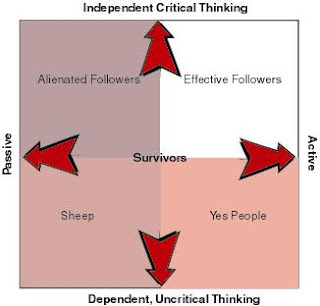
One of the things that paralyses most followers is fear. Fear is a powerful thing. Recently, I had someone tell me that they did not feel significant where they were working. This is a fear that will disable your effectiveness as a follower. There are some steps that need to occur to acknowledge and overcome these fears. Examine these seven steps to overcoming fear in your followership role and start being an effective follower again.
1. Acknowledge there is a problem
Take a look at your attitudes, behaviors, and beliefs to evaluate where you are. Then, go further to find out the fears that prescribe each of them. These fears are a driving force in how we live. After you have acknowledged that the fears exist, it will be easier for you to look at them in your decision making process.
2. Ask for help
The easiest way to overcome anything is by accountability. Having another hold you accountable for your actions and question you on your actions, attitudes, and beliefs, makes anyone stronger. These trusted friends or loved ones can help you to identify fears and then recognize the signs once they appear. I would not recommend a co-worker on this matter as it is best to avoid office gossip if one of your fears is your direct superior. Find a follower buddy. On the other hand, if you really trust your supervisor to help you in this area, make sure that it will not hinder your current situation and approach them humbly for help. There are so many resources out there to help you with overcoming fear. You may need to go to the next level of pastoral counseling or psychotherapy if it is needed.
3. Decide what really matters
What do you really care about in your job or in your life outside of the office? If you had a perfect vision of what life would be like, how could you take those elements and apply them to your followership role where you are at? It is easy at this point to make excuses for why you do not have this "ideal" world, but you can begin to make decisions that help lead you towards that goal. You may just have to find something that is significant in your life that represents what that ideal life looks, feels, smells, tastes, and sounds like. C.S. Lewis once said, "If I find in myself a desire which no experience in this world can satisfy, the most probable explanation is that I was made for another world." You can overcome the fear of not getting where you think you need to be to be happy, by acknowledging that this earth cannot satisfy our desires. This helps feed our effective followership.
4. Establish your followership goals
Establishing your followership goals helps lead you to being an effective follower. Look at where you are now and compare it to where you want to be. How far out of line with your goals are you? What do you need to do to get back on course? if you feel that you have "jumped ship" from your original course, how do you get back on that ship. Moreover, how do you serve, right where you are at, in an effective way to get you closer to those dreams. What if this is not where you need to be to establish those dreams? The next step is to do an audit to see what you need to do to get you from where you are now and where you want to be. Take bold steps if necessary.
5. Make a decision that will eliminate fear
To eliminate fear is not an easy task. It takes a bold, foundational, and life-altering move that is both mental and physical, but also spiritual. This includes all aspects of who you are. Somethings in life are not an option; you have deep seeded foundational worldviews that need to be explored. For example, if you have a boss or coworker that you do not like, you do not debate the matter, "Should I talk with the person or do I just murder them?" It is not an option, you already have it established in your mind that murder is wrong. Fear has to have the same strength behind it that you can not be fearful in your decision making. Fear can not dominate who you are. If it has dominated you, you need to make a real life decision to leave what is not real (fear) even though it has become very familiar to and comfortable for you.
6. Challenge the irrational fears
Who told you that you were worthless? Who said if you share with your supervisor what is really on your mind that you will lose your job? These irrational fears that you are living with have been accepted by you in the past and have become a reality, or truth, that you live each day. These irrational fears need to be challenged because they impact and direct every choice that you make. These fears will not go anywhere unless you challenge them.
7. Just do it
Action plans and a timeline are all that stand between your sheepish followership and effective followership. If you have dreams of getting to a corner office (or even an office with a window) someday, what are you doing to get there? Are you being effective where you are at? Do you need more education? What things are standing in your way of making this happen? Make the decision today to live without fear in your followership role. Do not listen to those voices telling you that you are not worthy. Establish an action plan and lay out a timeline to make this happen.
Sometimes we mistake living without fear for having also a lack of reverence. Reverence is an important thing to remember when we are being a courageous follower. We are in the place we are today because of the choices we made yesterday. We need to respect that, but then make choices to take us to where we feel we are led. Having a reverence for our position humbles us to enjoy the benefits we have to being in the very place we are right now and also enables us to look beyond this point towards a bright future without fear.
 Some of the individuals reading these articles may have followers under their leadership. We cannot assume that all followers are at a the "bottom" of an organizational chart. The chances are likely that most reading these posts do have some authority over other individuals. It is for this reason that we can not just talk about the role of our followership responsibilities, but also how to build up and develop our followers.
Some of the individuals reading these articles may have followers under their leadership. We cannot assume that all followers are at a the "bottom" of an organizational chart. The chances are likely that most reading these posts do have some authority over other individuals. It is for this reason that we can not just talk about the role of our followership responsibilities, but also how to build up and develop our followers.











